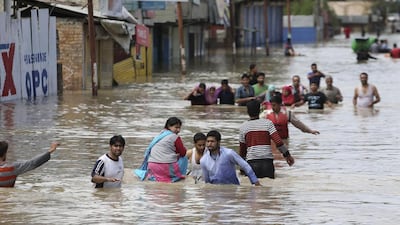NEW DELHI // More than 160 people are feared dead in floods in Jammu and Kashmir state, the worst that the northern state has witnessed in six decades.
Prime minister Narendra Modi on Sunday surveyed flood-hit areas from the air and met state officials in Jammu to assess the situation.
“This is a national level disaster,” Mr Modi said. He said victims and their relatives would be paid from an 11 billion-rupee (Dh670 million) in disaster relief fund.
At least 150 people have been killed in the state and several are missing.
The flooding has also affected Pakistan, where at least 142 people have been killed, with 108 villages damaged as well as farmland,
Although Indian rescue personnel worked through the weekend, their operations were hampered by the ceaseless rain. The rain, which started six days ago and has built in intensity, has swollen rivers like the Jhelum. One thousand villages in Jammu and 1,600 villages in Kashmir have been affected, with 450 of these villages now being completely submerged.
“This is an unprecedented situation and we are doing the best we can under the circumstances,” Omar Abdullah, the chief minister of Jammu and Kashmir, said on Twitter. “Please don’t panic, we will reach you, I promise.”
Mr Abdullah urged residents to stay on the upper floors of buildings and wait for boats and helicopters to reach them. The air force deployed 23 planes and 26 helicopters to help in the rescue.
Nearly 10,000 people have been rescued, the state government said. But thousands more remained trapped, as roads and bridges were washed away and telecommunications links snapped.
In Srinagar, the state’s capital and biggest urban centre, the water was about 4 metres deep in some neighbourhoods, submerging entire houses. Stranded residents left their homes to move in with friends or relatives in safer areas.
The compound of the renowned Shri Maharaja Hari Singh Hospital was inundated with floodwater.
“I’m in my 80s and I’ve never seen floods like this,” said Ghulam Nabi, speaking through a window from the third story of his house in the upscale Rajbagh neighborhood of Srinagar. “If this is how it is in my neighborhood, I cannot imagine the devastation in other areas.”
Despite calls to emergency services, Parvaiz Bukhari and his neighbours in the city’s central Rajbagh area remained trapped, with the water reaching the second of their third floors.
“I’ve seen a couple of boats go past but nobody has stopped,” said Mr Bukhari. “We can’t go out, the water is moving too fast. I can see gas cylinders, barrels, wood debris floating past.
“We will have to move to the roof but we are also worried about the building collapsing.”
The rain was expected to ease late Sunday night.
The state government said it needed 25,000 tents and 40,000 blankets for the thousands rescued who were straggling into relief camps.
ssubramanian@thenational.ae
* With additional reporting by Associated Press and Agence France-Presse

